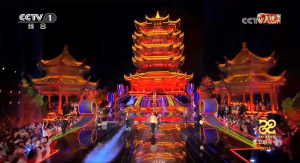One of the major television events in China each year is the China Central Television (CCTV) Spring Festival Gala on Lunar New Year. Running for up to 5 hours, the Gala is a grandiose affair featuring all kinds of musical, dancing, comedic, and dramatic performances. The event, which according to the Guinness Book of Records is the most watched television program in world, had 2.8 billion views this year alone, reaching all of China and across the diaspora.
The Gala, which is broadcast on China’s state television network, is also an extremely important source in understanding the goals of the Chinese government, as it approves and supports acts that promote its political goals. In watching the Gala, one can see what political messaging is currently being promoted, and what is not.
One thing that stood out at this year’s Spring Festival Gala was the inclusion of the U.S. pop rock band OneRepublic. The first American band to ever perform at the Gala, they played their hit song “Chasing Stars” in front of the Yellow Crane Tower in Wuhan. The location was not a coincidence. The band’s singer, Ryan Tedder, is known in China because he cooked Wuhan’s signature hot dry noodles as part of his “Quarantine Cuisine” series in early months of the COVID-19 pandemic in 2020,. His love for the noodles continued to be shown before the performance, as he got an image of the dish tattooed on his arm.
The Gala also had another American as a special guest: Evan Kail, a pawn shop owner and TikTok influencer, who became famous in 2022 after discovering a book with photos of Japanese war crimes during World War II, which he then donated to the Chinese government.
The inclusion of both of these American guests in China’s most-watched TV program is officially about sending “a message of China’s cultural openness.” It is a way for China to bypass Washington and promote friendly transcultural connections with the average American, while also letting Chinese citizens know it is okay to engage in Western culture.
Another sign of cultural openness in the Gala was a performance by Chinese and Peruvian artists. Mixing the traditional Chinese folk song “Lan Huahua” and the famous Peruvian orchestral piece “El Condor Pasa,” the piece was performed by Chinese singer Zhou Shen, Peruvian operatic tenor Juan Diego Florez, Chinese suona musician Niu Jiandang, and Peruvian pan flute artist Lucho Quequezana.
This performance was likely included in a nod to the Port of Chancay, a megaport in Peru that was built by China as part of the Belt and Road initiative. During the Asia-Pacific Economic Cooperation Forum in November 2024 in Peru, Chinese President Xi Jinping and Peruvian President Dina Boluarte virtually attended the port’s inauguration. Chancay port is planned to become a major hub for imports of Asian goods and exports of minerals such as lithium and copper.
The Gala also featured a very unique act done by robots, performing a complicated Chinese folk dance in perfect synchronization. The robots, which underwent three months of AI-driven training, perfectly danced in time with the music and human dancers. They expertly twirled handkerchiefs, throwing them up and catching them mid-air. The robots were created by Unitree robotics, a company based in Hangzhou, which is also home to DeepSeek and Alibaba.
Thanks to their uniqueness, these three performances stand out, but there are other more subtle aspects of the Gala that can demonstrate the political messages intended.
Alibaba, the Chinese tech giant, has had a tense relationship with the government since the tech crackdown in late 2020. However, this year they become a key part of the Spring Festival Gala, winning the bid to sponsor the event. The company used Alibaba cloud to stream the Gala across the globe in high definition, allowing artificial intelligence-based visual effects to enhance the program. Alibaba has regained the favor of the government, partially on the strength of its tech.
In previous years, when performers were from Hong Kong, Macau, or Taiwan, they would be credited as such. This year such performers were credited as “Chinese,” signaling a desire for national unity. Chinese state media Global Times described the change as meaning “we all come from China, there’s no need to make distinctions.” It’s a call for greater national unity coupled with an attempt to downplay unique local identities.
Back in 2021, China’s broadcasting regulator made international headlines when it said it would ban “effeminate” aesthetics of male celebrities, deriding them as “niangpao” or “sissy boys.” China’s government pledged to promote more masculine images of men. When one looks at the Gala performances today, however, an effeminate aesthetic appears to be as popular as ever, with many young male celebrities showcasing that look. The regulators have appeared to have given up imposing such restrictions, as the swell of popularity is too strong, and the brutal cost of such restrictions is too high.
The Spring Festival Gala is a massive undertaking, meticulously planned months in advance. It is a great source of joy for many of its viewers, even those who just have the TV on in the background as they gorge on dumplings. However, it is also a key platform for government messaging. It is important to note what is shown and what is not shown for indications not only of foreign policy direction, but also how the government interacts with its citizenry.

































